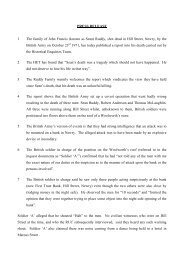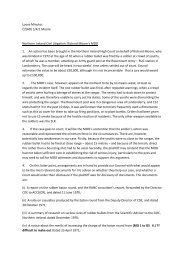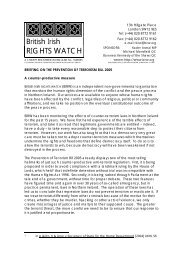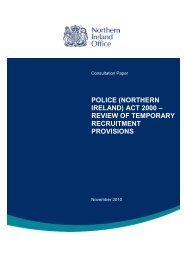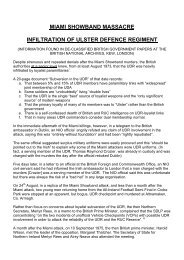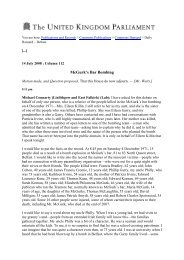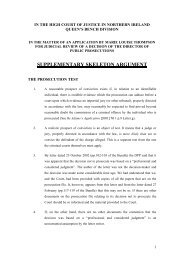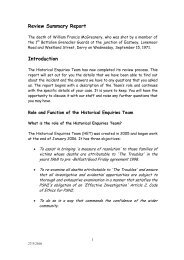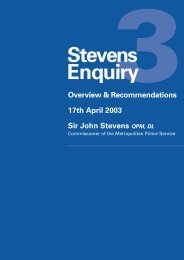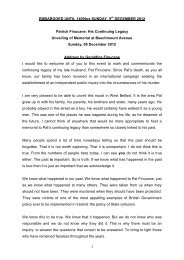Patrick Shanaghan v the United Kingdom - The Pat Finucane Centre
Patrick Shanaghan v the United Kingdom - The Pat Finucane Centre
Patrick Shanaghan v the United Kingdom - The Pat Finucane Centre
You also want an ePaper? Increase the reach of your titles
YUMPU automatically turns print PDFs into web optimized ePapers that Google loves.
28 SHANAGHAN v. THE UNITED KINGDOM JUDGMENT<br />
95. <strong>The</strong>se are all matters which are currently pending examination in <strong>the</strong><br />
civil proceedings brought by <strong>the</strong> applicant alleging collusion by <strong>the</strong> security<br />
forces in <strong>the</strong> killing, including <strong>the</strong> way in which <strong>the</strong> photographs were lost.<br />
<strong>The</strong> Court considers that in <strong>the</strong> circumstances of this case it would be<br />
inappropriate and contrary to its subsidiary role under <strong>the</strong> Convention to<br />
attempt to establish <strong>the</strong> facts of this case by embarking on a fact finding<br />
exercise of its own by summoning witnesses. Such an exercise would<br />
duplicate <strong>the</strong> proceedings before <strong>the</strong> civil courts which are better placed and<br />
equipped as fact finding tribunals. While <strong>the</strong> European Commission of<br />
Human Rights has previously embarked on fact finding missions in cases<br />
from Turkey where <strong>the</strong>re were pending proceedings against <strong>the</strong> alleged<br />
security force perpetrators of unlawful killings, it may be noted that <strong>the</strong>se<br />
proceedings had were criminal and had terminated, at first instance at least,<br />
by <strong>the</strong> time <strong>the</strong> Court was examining <strong>the</strong> applications. In those cases, it was<br />
an essential part of <strong>the</strong> applicants’ allegations that <strong>the</strong> defects in <strong>the</strong><br />
investigation were such as to render those criminal proceedings ineffective<br />
(see e.g. Salman v. Turkey, cited above, § 107, where <strong>the</strong> police officers<br />
were acquitted of torture due to <strong>the</strong> lack of evidence resulting principally<br />
from a defective autopsy procedure; Gül v. Turkey, cited above, § 89, where<br />
inter alia <strong>the</strong> forensic investigation at <strong>the</strong> scene and autopsy procedures<br />
hampered any effective reconstruction of events).<br />
96. In <strong>the</strong> present case, <strong>the</strong> Court does not consider that <strong>the</strong>re are any<br />
elements established which would deprive <strong>the</strong> civil courts of <strong>the</strong>ir ability to<br />
establish <strong>the</strong> facts and determine any misfeasance or negligence on <strong>the</strong> part<br />
of <strong>the</strong> security forces (see fur<strong>the</strong>r below concerning <strong>the</strong> applicant’s<br />
allegations about <strong>the</strong> defects in <strong>the</strong> police investigation, paragraph 100).<br />
97. Nor is <strong>the</strong> Court persuaded that it is appropriate to rely on <strong>the</strong><br />
documentary material provided by <strong>the</strong> parties to reach any conclusions as to<br />
responsibility for <strong>the</strong> death of <strong>the</strong> applicant’s son. Many of <strong>the</strong> written<br />
accounts provided have not been tested in examination or cross-examination<br />
and would provide an incomplete and potentially misleading basis for any<br />
such attempt. <strong>The</strong> situation cannot be equated to a death in custody where<br />
<strong>the</strong> burden may be regarded as resting on <strong>the</strong> State to provide a satisfactory<br />
and plausible explanation.<br />
98. <strong>The</strong> Court is also not prepared to conduct, on <strong>the</strong> basis of selective<br />
evidence, an analysis of incidents over <strong>the</strong> past thirty years with a view to<br />
establishing whe<strong>the</strong>r <strong>the</strong>y disclose a practice of collusion by security forces.<br />
This would go far beyond <strong>the</strong> scope of <strong>the</strong> present application.<br />
99. Conversely, as regards <strong>the</strong> Government’s argument that <strong>the</strong><br />
availability of civil proceedings provided <strong>the</strong> applicant with a remedy which<br />
he has yet to exhaust as regards Article 35 § 1 of <strong>the</strong> Convention and,<br />
<strong>the</strong>refore that no fur<strong>the</strong>r examination of <strong>the</strong> case is required under <strong>the</strong><br />
Article 2, <strong>the</strong> Court recalls that <strong>the</strong> obligations of <strong>the</strong> State under Article 2<br />
cannot be satisfied merely by awarding damages (see e.g. Kaya v. Turkey,



